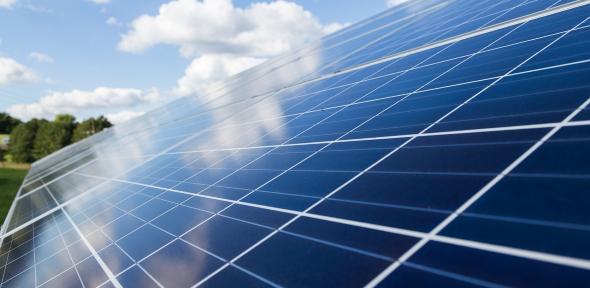
Advancements in this field are through emerging PV materials and devices, including halide perovskites, organic semiconductors and nanomaterials. Emerging concepts cover high efficiency tandem solar cells, luminescence solar concentration approaches, ultra-lightweight PV cells for space and photo-electrochemical work, including production of solar fuels.
Cambridge’s strengths lie in the combination of emerging materials, characterisation techniques and high efficiency concepts, all of which are world leading. Development of the higher efficiency materials and devices required for uptake of solar power at scale can be achieved through enhanced understanding and control of materials properties to increase efficiency, performance and recyclability, therefore driving down costs of systems.
Tandem solar concepts with new materials can push cell efficiencies towards 40% under lab conditions, and are likely to be developed and commercialised over the next ten years, enabling a flexible range of solar technologies to accompany current silicon solar cell technology. These complementary solar PV materials technologies combined with novel energy storage will allow us to meet different types of energy needs by 2050. Solar fuels can also play a role in enabling green chemistry and fuels, either from direct PV conversion or smart integrated photoelectrochemical cell designs.
Some key centres and initiatives include:
- Henry Royce Institute for Advanced Materials
- Winton Programme for the Physics of Sustainability
- Cambridge Centre for Carbon Reduction in Chemical Technology (C4T)
- Centre of Advanced Materials for Integrated Energy Systems (CAM-IES)
Spin-outs:
Cambridge Photon Technologies developing next-generation advanced materials
Swift Solar manufacturing lightweight solar panels using perovskite materials
FlexEnable manufacturing solutions for flexible organic electronics
Researchers working in this area:
| Prof Manish Chhowalla |
Professor of Materials Science Member of the Energy IRC Steering Committee |
| Prof Jonathan Cullen |
Professor of Sustainable Engineering Member of the Energy IRC Steering Committee |
| Prof Rachel Evans | Professor of Materials Chemistry |
| Prof Sir Richard Friend |
Cavendish Professor of Physics Director of the Energy IRC Steering Committee, |
| Prof Neil Greenham | Professor of Physics |
| Professor Hannah Joyce | Professor of Low-Dimensional Electronics |
| Dr Bartomeu Monserrat | Gianna Angelopoulos Lecturer in Computational Materials Science |
| Prof Richard Penty | Professor of Photonics |
| Prof Akshay Rao | Professor in Physics and Solid State |
| Prof Sam Stranks |
Professor of Optoelectronics Member of the Energy IRC Steering Committee |

